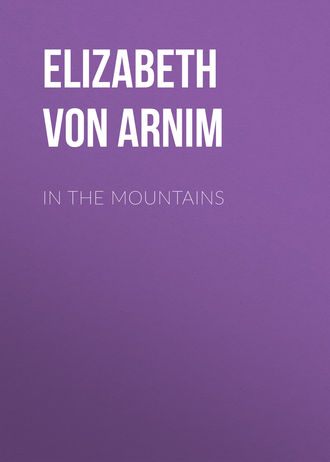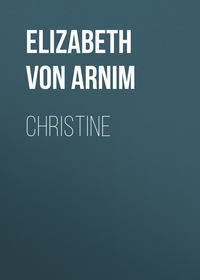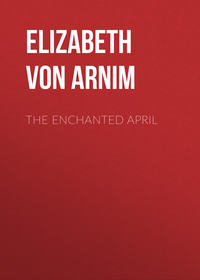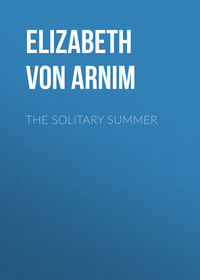 полная версия
полная версияIn the Mountains
Well, where was I? Oh yes—at the transpiration. Antoine let it pass over him, as I have said, without a ruffle, and drew my attention to the chickens who would have to be fed and the cow who would have to be milked. Perhaps the cow might be milked on his return, but the chickens—
Antoine was softening.
I said quickly that all he had to do would be to put the chickens' food ready and I would administer it, and as for the cow, why not let her have a rest for once, why not let her for once not he robbed of what was after all her own?
And to cut the conversation short, and determined that my birthday should not pass without somebody getting a present, I ran upstairs and fetched down a twenty-franc note and pressed it into Antoine's hand and said breathlessly in a long and voluble sentence that began with Voilà, but didn't keep it up at that level, that the twenty francs were for his expenses for himself and Mrs. Antoine down in the valley, and that I hoped they would enjoy themselves, and would he remember me very kindly to his maman, to whom he would no doubt pay a little visit during the course of what I trusted would be a long, crowded, and agreeable day.
They went off ultimately, but with reluctance. Completely undignified, I stood on the low wall of the terrace and waved to them as they turned the corner at the bottom of the path.
'Mille félicitations!' I cried, anxious that somebody should be wished happiness on my birthday.
'If I am going to have a lonely birthday it shall be thoroughly lonely,' I said grimly to myself as, urged entirely by my volition, the Antoines disappeared and left me to the solitary house.
I decided to begin my day's work by making my bed, and went upstairs full of resolution.
Mrs. Antoine, however, had done that; no doubt while I was arguing with Antoine.
The next thing, then, I reflected, was to tidy away breakfast, so I came downstairs again, full of more resolution.
Mrs. Antoine, however, had done that too; no doubt while I was still arguing with Antoine.
Well then, oughtn't I to begin to do something with potatoes? With a view to the dinner-hour? Put them on, or something? I was sure the putting on of potatoes would make me perspire. I longed to start my transpiration in case by any chance, if I stayed too long inactive and cool, I should notice how very silent and empty....
I hurried into the kitchen, a dear little place of white tiles and copper saucepans, and found pots simmering gently on the stove: potatoes in one, and in the other bits of something that well might be chicken. Also, on a tray was the rest of everything needed for my dinner. All I would have to do would be to eat it.
Baulked, but still full of resolution, I set out in search of the lawn-mower. It couldn't be far away, because nothing is able to be anything but close on my narrow ledge of rock.
Mou-Mou, sitting on his haunches in the shade at the back of the house, watched me with interest as I tried to open the sorts of outside doors that looked as if they shut in lawn-mowers.
They were all locked.
The magnificent Mou-Mou, who manages to imitate Antoine's trick of not being surprised, though he hasn't yet quite caught his air of absence of curiosity, got up after the first door and lounged after me as I tried the others. He could do this because, though tied up, Antoine has ingeniously provided for his exercise, and at the same time for the circumvention of burglars, by fixing an iron bar the whole length of the wall behind the house and fastening Mou-Mou's chain to it by a loose ring. So that he can run along it whenever he feels inclined; and a burglar, having noted the kennel at the east end of this wall and Mou-Mou sitting chained up in front of it, would find, on preparing to attack the house at its west and apparently dogless end, that the dog was nevertheless there before him. A rattle and a slide, and there would be Mou-Mou. Very morale-shaking. Very freezing in its unexpectedness to the burglar's blood, and paralysing to his will to sin. Thus Antoine, thinking of everything, had calculated. There hasn't ever been a burglar, but, as he said of his possible suppurating wounds, 'Il ne faut pas attendre qu'on les a pour se procurer le remède.'
Mou-Mou accordingly came with me as I went up and down the back of the house trying the range of outside doors. I think he thought at last it was a game, for as each door wouldn't open and I paused a moment thwarted, he gave a loud double bark, as one who should in the Psalms, after each verse, say Selah.
Antoine had locked up the lawn-mower. The mowing was to be put off till to-morrow rather than that Madame in the heat should mow. I appreciated the kindness of his intentions, but for all that was much vexed by being baulked. On my birthday too. Baulked of the one thing I really wanted, la transpiration. It didn't seem much to ask on my birthday, I who used, without so much as lifting a finger, to acquire on such occasions quite other beads.
Undecided, I stood looking round the tidy yard for something I could be active over, and Mou-Mou sat upright on his huge haunches watching me. He is so big that in this position our heads are on a level. He took advantage of this by presently raising his tongue—it was already out, hanging in the heat—as I still didn't move or say anything, and giving my face an enormous lick. So then I went away, for I didn't like that. Besides, I had thought of something.
In the flower-border along the terrace would be weeds. Flower-borders always have weeds, and weeding is arduous. Also, all one wants for weeding are one's own ten fingers, and Antoine couldn't prevent my using those. So that was what I would do—bend down and tear up weeds, and in this way forget the extraordinary sunlit, gaping, empty little house....
So great, however, had been the unflagging diligence of Antoine, and also perhaps so poor and barren the soil, that after half an hour's search I had only found three weeds, and even those I couldn't be sure about, and didn't know for certain but what I might be pulling up some precious bit of alpine flora put in on purpose and cherished by Antoine. All I really knew was that what I tore up wasn't irises, and wasn't delphiniums, and wasn't pansies; so that, I argued, it must be weeds. Anyhow, I pulled three alien objects out, and laid them in a neat row to show Antoine. Then I sat down and rested.
The search for them had made me hot, but that of course wouldn't last. It was ages before I need go and feed the chickens. I sat on the terrace wall wondering what I could do next. It was a pity that the Antoines were so admirable. One could overdo virtue. A little less zeal, the least judicious neglect on their part, and I would have found something useful to do.
The place was quite extraordinarily silent. There wasn't a sound. Even Mou-Mou round at the back, languid in the heat, didn't move. The immense light beat on the varnished wooden face of the house and on the shut shutters of all the unused rooms. Those rooms have been shut like that for five years. The shutters are blistered with the fierce sun of five summers, and the no less fierce sun of five winters. Their colour, once a lively, swaggering blue, has faded to a dull grey: I sat staring up at them. Suppose they were suddenly to be opened from inside, and faces that used to live in them looked out?
A faint shudder trickled along my spine.
Well, but wouldn't I be glad really? Wouldn't they be the dearest ghosts? That room at the end, for instance, so tightly shut up now, that was where my brother used to sleep when he came out for his holidays. Wouldn't I love to see him look out at me? How gaily he used to arrive,—in such spirits because he had got rid of work for a bit, and for a series of divine weeks was going to stretch himself in the sun! The first thing he always did when he got up to his room was to hurry out on to its little balcony to see if the heavenly view of the valley towards the east with the chain of snow mountains across the end were still as heavenly as he remembered it; and I could see him with his head thrown back, breathing deep breaths of the lovely air, adoring it, radiant with delight to have got back to it, calling down to me to come quick and look, for it could never have been so beautiful as at that moment and could never possibly be so beautiful again.
I loved him very much. I don't believe anybody ever had so dear a brother. He was so quick to appreciate and understand, so slow to anger, so clear of brain and gentle of heart. Of course he was killed. Such people always are, if there is any killing going on anywhere. He volunteered at the very beginning of the war, and though his fragility saved him for a long time he was at last swept in. That was in March 1918. He was killed the first week. I loved him very much, and he loved me. He called me sweet names, and forgave me all my trespasses.
And in the next room to that—oh well, I'm not going to dig out every ghost. I can't really write about some of them, the pain hurts too much. I've not been into any of the shut rooms since I came back. I couldn't bear it. Here out of doors I can take a larger view, not mind going to the places of memories; but I know those rooms will have been kept as carefully unchanged by Antoine as I found mine. I daren't even think of them. I had to get up off the wall and come away from staring up at those shutters, for suddenly I found myself right on the very edge of the dreadful pit I'm always so afraid of tumbling into—the great, black, cold, empty pit of horror, of realisation....
That's why I've been writing all this, just so as not to think....
Bedtime.
I must put down what happened after that. I ought to be in bed, but I must put down how my birthday ended.
Well, there I was sitting, trying by writing to defend myself against the creeping fear of the silence round me and the awareness of those shut rooms up stairs, when Mou-Mou barked. He barked suddenly and furiously; and the long screech of his chain showed that he was rushing along the wall to the other side of the house.
Instantly my thoughts became wholesome. I jumped up. Here was the burglar at last. I flew round to greet him. Anything was better than those shutters, and that hot, sunlit silence.
Between my departure from the terrace and my arrival at the other side of the house I had had time, so quickly did my restored mind work, to settle that whoever it was, burglar or not, I was going to make friends. If it really were a burglar I would adopt the line the bishop took towards Jean Valjean, and save him from the sin of theft by making him a present of everything he wished to take,—conduct which perhaps might save me as well, supposing he was the kind of burglar who would want to strangle opposition. Also, burglar or no burglar, I would ask him to dinner; compel him, in fact, to come in and share my birthday chicken.
What I saw when I got round, standing just out of reach of the leaping Mou-Mou on the top of the avalanche wall, looking down at him with patience rather than timidity, holding their black skirts back in case an extra leap of his should reach them, were two women. Strangers, not natives. Perhaps widows. But anyhow people who had been bereaved.
I immediately begged them to come in. The relief and refreshment of seeing them! Two human beings of obvious respectability, warm flesh and blood persons, not burglars, not ghosts, not even of the sex one associates with depredation,—just decent, alive women, complete in every detail, even to each carrying an umbrella. They might have been standing on the curb in Oxford Street waiting to hail an omnibus, so complete were they, so prepared in their clothes to face the world. Button boots, umbrella,—I hadn't seen an umbrella since I got here. What you usually take for a walk on the mountains is a stout stick with an iron point to it; but after all, why shouldn't you take an umbrella? Then if it rains you can put it up, and if the sun is unbearable you can put it up too, and it too has a metal tip to it which you can dig into the ground if you begin to slide down precipices.
'Bon jour,' I said eagerly, looking up at these black silhouettes against the sky. 'Je vous prie de venir me voir.'
They stared at me, still holding back their skirts from the leaping dog.
Perhaps they were Italians. I am close to Italy, and Italian women usually dress in black.
I know some Italian words, and I know the one you say when you want somebody to come in, so I tried that.
'Avanti,' I said breathlessly.
They didn't. They still just stood and stared.
They couldn't be English I thought, because underneath their black skirts I could see white cotton petticoats with embroidery on them, the kind that England has shed these fifty years, and that is only now to be found in remote and religious parts of abroad, like the more fervent portions of Lutheran Germany. Could they be Germans? The thought distracted me. How could I ask two Germans in? How could I sit at meat with people whose male relations had so recently been killing mine? Or been killed by them, perhaps, judging from their black clothes. Anyhow there was blood between us. But how could I resist asking them in, when if I didn't there would be hours and hours of intolerable silence and solitude for me, till evening brought those Antoines back who never ought to have been let go? On my birthday, too.
I know some German words—it is wonderful what a lot of languages I seem to know some words in—so I threw one up at them between two of Mou-Mou's barks.
'Deutsch?' I inquired.
They ignored it.
'That's all my languages,' I then said in despair.
The only thing left that I might still try on them was to talk on my fingers, which I can a little; but if they didn't happen, I reflected, to be deaf and dumb perhaps they wouldn't like that. So I just looked up at them despairingly, and spread out my hands and drew my shoulders to my ears as Mrs. Antoine does when she is conveying to me that the butter has come to an end.
Whereupon the elder of the two—neither was young, but one was less young—the elder of the two informed me in calm English that they had lost their way, and she asked me to direct them and also to tell the dog not to make quite so much noise, in order that they might clearly understand what I said. 'He is a fine fellow,' she said, 'but we should be glad if he would make less noise.'
The younger one said nothing, but smiled at me. She was pleasant-looking, this one, flushed and nicely moist from walking in the heat. The other one was more rocky; considering the weather, and the angle of the slope they had either come up or down, she seemed quite unnaturally arid.
I seized Mou-Mou by the collar, and ran him along to his kennel.
'You stay there and be good,' I said to him, though I know he doesn't understand a word of English. 'He won't hurt you,' I assured the strangers, going back to them.
'Ah,' said the elder of the two; and added, 'I used to say that to people about my dog.'
They still stood motionless, holding their skirts, the younger one smiling at me.
'Won't you come down?' I said. 'Come in and rest a little? I can tell you better about your road if you'll come in. Look—you go along that path there, and it brings you round to the front door.'
'Will the dog be at the front door?' asked the elder.
'Oh no—besides, he wouldn't hurt a fly.'
'Ah,' said the elder eyeing Mou-Mou sideways, who, from his kennel, eyed her, 'I used to say that to people about my dog.'
The younger one stood smiling at me. They neither of them moved.
'I'll come up and bring you down,' I said, hurrying round to the path that leads from the terrace on to the slope.
When they saw that this path did indeed take them away from Mou-Mou they came with me.
Directly they moved he made a rush along his bar, but arrived too late and could only leap up and down barking.
'That's just high spirits,' I said. 'He is really most goodnatured and affectionate.'
'Ah,' said the elder, 'I used to say that to people—'
'Mind those loose stones,' I interrupted; and I helped each one down the last crumbly bit on to the terrace.
They both had black kid gloves on. More than ever, as I felt these warm gloves press my hand, was I sure that what they really wanted was an omnibus along Oxford Street.
Once on the level and out of sight of Mou-Mou, they walked with an air of self-respect. Especially the elder. The younger, though she had it too, seemed rather to be following an example than originating an attitude. Perhaps they were related to a Lord Mayor, I thought. Or a rector. But a Lord Mayor would be more likely to be the cause of that air of glowing private background to life.
They had been up the mountain, the elder told me, trying to find somewhere cool to stay in, for the valley this weather was unendurable. They used to know this district years ago, and recollected a pension right up in the highest village, and after great exertions and rising early that morning they had reached it only to find that it had become a resort for consumptives. With no provision for the needs of the passing tourist; with no desire, in fact, in any way to minister to them. If it hadn't been for me, she said, as they sat on the cool side of the house drinking lemonade and eating biscuits, if it hadn't been for me and what she described with obvious gratitude—she couldn't guess my joy at seeing them both!—as my kindness, they would have had somehow to clamber down foodless by wrong roads, seeing that they had lost the right one, to the valley again, and in what state they would have re-entered that scorching and terrible place she didn't like to think. Tired as they were. Disappointed, and distressingly hot. How very pleasant it was up here. What a truly delightful spot. Such air. Such a view. And how agreeable and unexpected to come across one of one's own country-women.
To all this the younger in silence smiled agreement.
They had been so long abroad, continued the elder, that they felt greatly fatigued by foreigners, who were so very prevalent. In their pension there were nothing but foreigners and flies. The house wasn't by any chance—no, of course it couldn't be, but it wasn't by any chance—her voice had a sudden note of hope in it—a pension?
I shook my head and laughed at that, and said it wasn't. The younger one smiled at me.
Ah no—of course not, continued the elder, her voice fading again. And she didn't suppose I could tell them of any pension anywhere about, where they could get taken in while this great heat lasted? Really the valley was most terribly airless. The best hotel, which had, she knew, some cool rooms, was beyond their means, so they were staying in one of the small ones, and the flies worried them. Apparently I had no flies up here. And what wonderful air. At night, no doubt, it was quite cool. The nights in the valley were most trying. It was difficult to sleep.
I asked them to stay to lunch. They accepted gratefully. When I took them to my room to wash their hands they sighed with pleasure at its shadiness and quiet. They thought the inside of the house delightfully roomy, and more spacious, said the elder, while the younger one smiled agreement, than one would have expected from its outside. I left them, sunk with sighs of satisfaction, on the sofa in the hall, their black toques and gloves on a chair beside them, gazing at the view through the open front door while I went to see how the potatoes were getting on.
We lunched presently in the shade just outside the house, and the strange ladies continued to be most grateful, the elder voicing their gratitude, the younger smiling agreement. If it was possible to like one more than the other, seeing with what enthusiasm I liked them both, I liked the younger because she smiled. I love people who smile. It does usually mean sweet pleasantness somewhere.
After lunch, while I cleared away, having refused their polite offers of help,—for they now realised I was alone in the house, on which, however, though it must have surprised them they made no comment,—they went indoors to the sofa again, whose soft cushions seemed particularly attractive to them; and when I came back the last time for the breadcrumbs and tablecloth, I found they had both fallen asleep, the elder one with her handkerchief over her face.
Poor things. How tired they were. How glad I was that they should be resting and getting cool. A little sleep would do them both good.
I crept past them on tiptoe with my final armful, and was careful to move about in the kitchen very quietly. It hadn't been my intention, with guests to lunch, to wash up and put away, but rather to sit with them and talk. Not having talked for so long it seemed a godsend, a particularly welcome birthday present, suddenly to have two English people drop in on me from the skies. Up to this moment I had been busy, first getting lemonade to slake their thirst and then lunch to appease their hunger, and the spare time in between these activities had been filled with the expression of their gratitude by the elder and her expatiations on the house and what she called the grounds; but I had looked forward to about an hour's real talk after lunch, before they would begin to want to start on their long downward journey to their pension,—talk in which, without being specially brilliant any of us, for you only had to look at us to see we wouldn't be specially that, we yet might at least tell each other amusing things about, say, Lord Mayors. It is true I don't know any Lord Mayors, though I do know somebody whose brother married the daughter of one; but if they could produce a Lord Mayor out of up their sleeve, as I suspected, I could counter him with a dean. Not quite so showy, perhaps, but more permanent. And I did want to talk. I have been silent so long that I felt I could talk about almost anything.
Well, as they were having a little nap, poor things, I would tidy up the kitchen meanwhile, and by the time that was done they would be refreshed and ready for half an hour's agreeable interchange of gossip.
Every now and then during this tidying I peeped into the hall in case they were awake, but they seemed if anything to be sounder asleep each time. The younger one, her flushed face half buried, in a cushion, her fair hair a little ruffled, had a pathetic look of almost infantile helplessness; the elder, discreetly veiled by her handkerchief, slept more stiffly, with less abandonment and more determination. Poor things. How glad I was they should in this way gather strength for the long, difficult scramble down the mountain; but also presently I began to wish they would wake up.
I finished what I had to do in the kitchen, and came back into the hall. They had been sleeping now nearly half an hour. I stood about uncertainly. Poor things, they must be dreadfully tired to sleep like that. I hardly liked to look at them, they were so defenceless, and I picked up a book and tried to read; but I couldn't stop my eyes from wandering over the top of it to the sofa every few minutes, and always I saw the same picture of profound repose.
Presently I put down the book, and wandered out on to the terrace and gazed awhile at the view. That, too, seemed wrapped in afternoon slumber. After a bit I wandered round the house to Mou-Mou. He, too, was asleep. Then I came back to the front door and glanced in at my guests. Still no change. Then I fetched some cigarettes, not moving this time quite so carefully, and going out again sat on the low terrace-wall at a point from which I could see straight on to the sofa and notice any movement that might take place.
I never smoke except when bored, and as I am never bored I never smoke. But this afternoon it was just that unmanageable sort of moment come upon me, that kind of situation I don't know how to deal with, which does bore me. I sat on the wall and smoked three cigarettes, and the peace on the sofa remained complete. What ought one to do? What did one do, faced by obstinately sleeping guests? Impossible deliberately to wake them up. Yet I was sure—they had now been asleep nearly an hour—that when they did wake up, polite as they were, they would be upset by discovering that they had slept. Besides, the afternoon was getting on. They had a long way to go. If only Mou-Mou would wake up and bark.... But there wasn't a sound. The hot afternoon brooded over the mountains in breathless silence.









